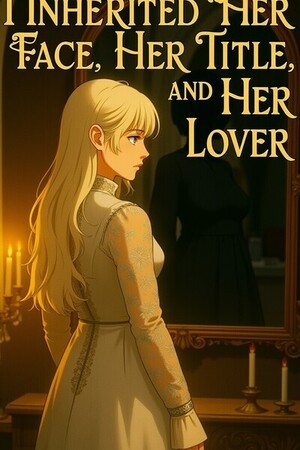Chapter 7:
Chapter 7 The City
I Inherited Her Face, Her Title, and Her Lover
"The town square first, I think," my father's voice drifted from the front of the carriage. "Let's show Aurelia some of the life of the city."
"Right on, Your Grace," Lady Octavi's voice replied, and I felt the carriage shift as it turned onto a broader street.
The city of Florence unfolded before my eyes, a vibrant, living tapestry. The air was thick with the scent of baking bread, hot metal from a nearby smithy, and the faint, sweet perfume of the flowers that spilt from window boxes. Unlike the silent halls of the mansion, the city was a symphony of sound: the chatter of merchants, the laughter of children, and the rhythmic clang of a blacksmith's hammer. I watched, fascinated, as people bustled along the clean, paved sidewalks.
I pointed to the carved wooden signs hanging above the shopfronts. "Father, Mother, what do the symbols mean?"
"They tell you the trade, Aurelia," my father explained. "A way for everyone, even those who cannot read, to find what they need."
"The anvil with two crossed hammers is a blacksmith," my mother added, pointing. "The overflowing glass is a tavern, the scales a trade market, and the fork and spoon, a restaurant."
My eyes scanned the signs, each a small piece of a world I was just beginning to understand. Then I saw a more complex insignia: a knight on horseback, a banner held high in one hand and a sword in the other. "And that one?"
"An army insignia," my father said, his voice taking on a more serious tone. "That building is a garrison for our Cataphract unit—our finest heavy cavalry."
"Are there many of them?"
"Enough," he said simply, a note of finality in his voice that discouraged further questions.
Soon, the streets opened up into a vast, sun-drenched square. It was even more alive than the streets we had just left, a whirlwind of activity. In the centre stood a magnificent statue of a long-haired woman with a single, graceful wing unfurling from her back. All around her, performers entertained the crowds: a juggler tossing a dizzying array of objects into the air and a pair of young women, one singing a romantic ballad while the other drew a haunting melody from a strange, stringed instrument on her shoulder.
"Aurelia," my father said, his voice pulling me from my reverie. "Your mother and I have some ducal business to attend to nearby. You may stroll around the square with Lady Octavi and Adel. We will meet you back here in an hour."
"Of course, Father."
They departed on foot, melting into the crowd without a single guard, their confidence a testament to the peace and security of their city. I, on the other hand, felt a strange mix of excitement and apprehension. This was my first taste of freedom, my first moment in this new life without the watchful eyes of my parents.
"Who is she?" I asked, my gaze drawn back to the statue. It was immense, at least three times Lady Octavi's height, carved from a single piece of white marble.
"She is Gennaia," Lady Octavi replied.
"A goddess?"
"Yes. One of the most timid, and some say, the weakest of the gods."
"Because of the incompetence of her being a goddess," Adel interjected, her voice sharp and dismissive.
Lady Octavi shot Adel a look, not of anger, but of mild disagreement. "There are many interpretations," she said diplomatically. "Some believe the single wing is a mark of her weakness. Others believe it is a symbol of her freedom. Gennaia was the only goddess who regularly visited the human realm, and it is said she sacrificed one of her wings as the price for her transformations into a mortal. She is here because Florence was her favourite city."
After a moment of contemplation, we moved on, drawn by the beautiful music of the two performers. The singer's voice was clear and sweet, and the composer, a trobairitz as Octavi called her, played an instrument called a vielle with a skill that was mesmerising. When they finished their song, the singer began to walk through the crowd with a small bag, collecting coins.
"Adel, do you have any money?" I asked, realising I had none.
"Of course, my lady."
"Allow me," Lady Octavi said, stepping forward as the singer approached us. She dropped a handful of coins into the bag. I saw the glint of silver.
The singer's eyes widened in disbelief. She looked from the coins to Lady Octavi and then to me. Our eyes met, and she immediately dropped into a deep curtsy, a gesture so formal and unexpected that it drew the attention of everyone around us. The trobairitz, seeing her partner's reaction, rushed over and did the same.
I offered them a small, awkward wave and quickly walked away, Adel and Octavi following close behind. "What did you give them?" I whispered to Octavi.
"Eight silver coins," she replied simply.
"Is that a lot?"
"Well," she mused, "a room at a decent inn with three meals costs about ten copper coins a day. One silver coin is worth one hundred copper coins. So, eight silver coins are enough to keep a family fed and sheltered for more than two months. I could have given them gold, if you wished."
I was stunned. "And it's alright for you to give away that much?"
She looked at me, a hint of confusion in her eyes. "My lady, for us, silver coins are of little consequence." She turned to Adel. "Adel, how much did His Grace and Madam provide for my lady's expenses today?"
"Fifty platinum coins, my lady," Adel answered without hesitation.
"Fifty... platinum?" I struggled to comprehend the scale of such wealth. Lady Octavi explained that one platinum coin was worth ten thousand silver coins. The number was so vast, so astronomical, that it felt meaningless. "Why would they give me so much?"
"For them, it is a small sum," she said simply.
We continued our stroll, weaving through the street merchants and their colourful displays of trinkets and wares. Suddenly, I felt a slight bump from behind. I turned to see Adel holding a small, shabby-looking boy by the scruff of his neck. He couldn't have been much older than Aurelio.
"I felt a hand where it didn't belong," Adel said, her voice dangerously calm as she lifted the struggling boy into the air.
"RELEASE ME!" he shrieked, his small legs kicking wildly.
"Well, well. A thief," Lady Octavi said, her hand resting on the pommel of her sword, her expression grim.
The boy's face was a mask of terror. "What should we do with him, my lady?" Adel asked.
"Put him down first," I said.
Adel lowered him to the ground, but her grip remained firm. The moment his feet touched the pavement, he tried to bolt, but Adel's hand was like a grasp.
"Are you daring to run from me, boy?" she hissed, her voice low and menacing.
"Waaa..." the boy began to cry, his bravado crumbling.
I knelt in front of him. "What's your name?"
"I don't have one," he mumbled, his eyes downcast.
"He's a street kid, my lady," Adel said. "Their parents throw them away, so they never have names."
"That's horrible."
"Wait," Lady Octavi interjected, her eyes narrowed in suspicion. "That shouldn't be possible. His Grace, your father, established a network of orphanages throughout the duchy. There are no more children living on the streets. Boy, are you lying to us?"
"No! I'm not lying! I live on the streets!" he insisted, his voice cracking.
"Then why did you steal?" I asked gently.
"Because we haven't eaten in two days."
"We?"
"My little sisters."
"You have sisters?"
"Not by blood. They're like me... thrown away."
"So you take care of them?" I asked, a wave of admiration washing over me. "What a brave boy you are."
He blushed, a faint pink spreading across his dirt-streaked cheeks.
"Can you take us to them? I want to meet them."
His eyes widened in fear. "What are you going to do? Sell us?"
"Of course not. I just want to see where you live."
He hesitated for a long moment, his eyes darting between the three of us. Finally, he gave a small, reluctant nod. "Okay... you can come."
Lady Octavi leaned in and whispered, "Are you sure about this, my lady?"
"It's okay," I whispered back. I turned to the boy. "Adel will release you, but you must not run. Lead us to where you stay."
"Alright."
Adel released him, and to his credit, he stayed put. He led us away from the bustling square, down a series of narrow, winding alleyways, each one darker and dirtier than the last. Finally, we arrived in a cramped, dead-end street, the air thick with the stench of refuse. There was no one there.
"I don't see your sisters," I said.
The boy put two fingers in his mouth and let out a sharp, piercing whistle. A moment later, three small, timid faces peeked out from behind a pile of rubbish in a dark corner. We walked over to them. They were huddled together on a makeshift bed of old newspapers and rags. They were triplets, all with the same tangled brown hair and wide, frightened brown eyes.
The boy had black hair and black eyes, a stark contrast to the girls he so fiercely protected.




Please sign in to leave a comment.